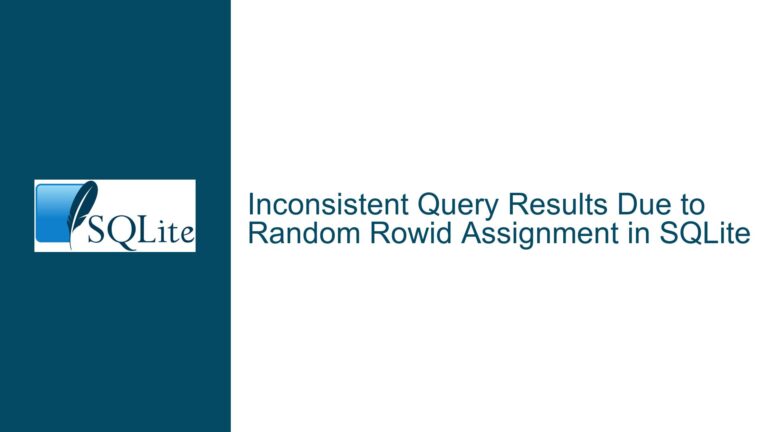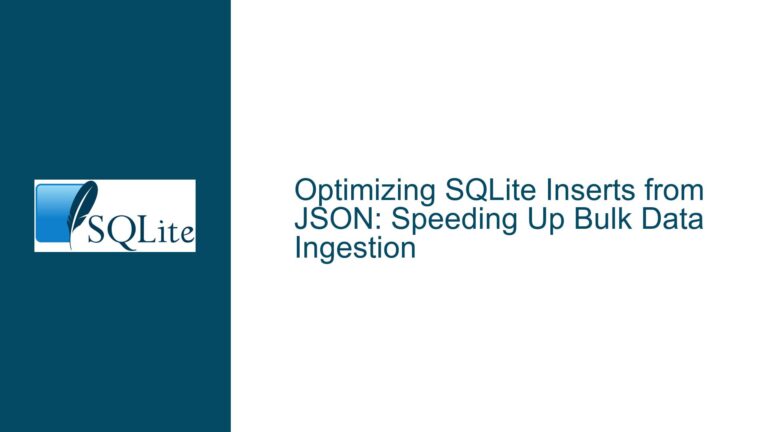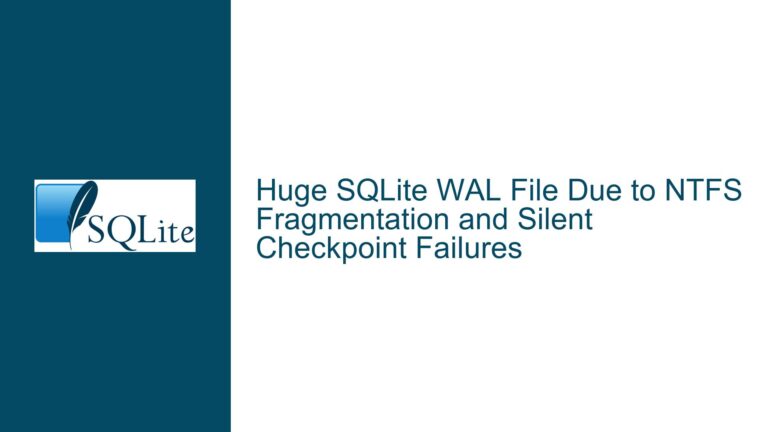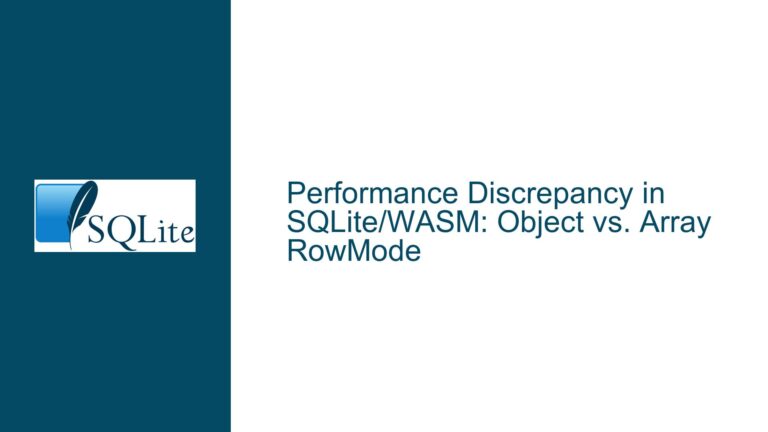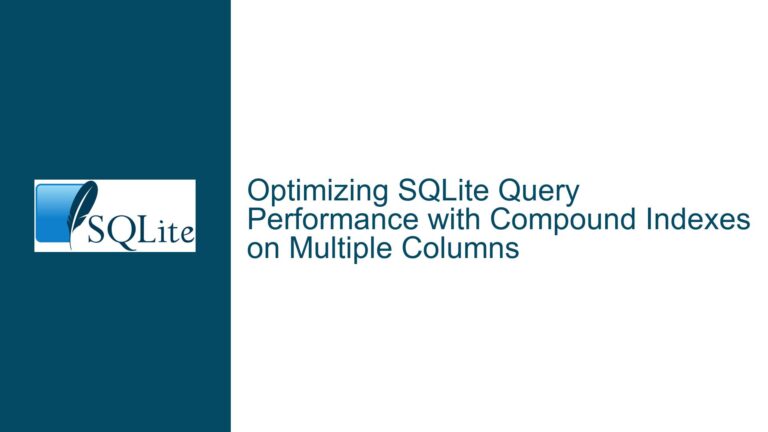ASAN Warning: Integer Overflow in pPager->aStat Array
Issue Overview: ASAN/UBSAN Detected Integer Overflow in pPager->aStat Array
The core issue revolves around an AddressSanitizer (ASAN) and UndefinedBehaviorSanitizer (UBSAN) warning detected in the SQLite source code, specifically within the getPageNormal function. The warning indicates a signed integer overflow occurring in the pPager->aStat array, which is used to track pager statistics. The overflow happens when incrementing the PAGER_STAT_HIT counter, which tracks the number of cache hits during database operations. The warning message explicitly states that the value 2147483647 + 1 cannot be represented in a signed 32-bit integer (int), leading to undefined behavior.
The pPager->aStat array is part of the Pager structure, which manages the paging subsystem in SQLite. The PAGER_STAT_HIT counter is incremented every time a page is successfully retrieved from the cache, avoiding the need to read it from disk. While this overflow is currently considered benign because it only affects statistics, it raises concerns about the robustness of the code and the potential for similar issues in other parts of the system. Additionally, the behavior of integer overflow in C is undefined, which means the compiler is free to handle it in any way, including wrapping around to INT_MIN or causing a runtime crash.
The issue is particularly notable because it involves a critical component of SQLite’s performance optimization: the pager cache. The pager is responsible for managing database pages in memory, ensuring efficient access to frequently used data. Any instability or undefined behavior in this subsystem could have cascading effects on the reliability and performance of the database.
Possible Causes: Signed Integer Overflow in Statistics Tracking
The root cause of the issue lies in the use of a signed 32-bit integer (int) for the pPager->aStat array counters. The PAGER_STAT_HIT counter is incremented every time a page is successfully retrieved from the cache. Over time, if the number of cache hits exceeds INT_MAX (2147483647), the counter will overflow, resulting in undefined behavior. This is a classic example of an integer overflow vulnerability, where the data type chosen for a counter is insufficient to handle the range of values it needs to represent.
The choice of a signed integer for the pPager->aStat array is likely historical, as SQLite has been in development for over two decades. At the time the code was written, the likelihood of exceeding INT_MAX cache hits was considered negligible. However, modern workloads and long-running database instances can easily surpass this limit, especially in high-throughput environments. The use of a signed integer instead of an unsigned integer (unsigned int) exacerbates the problem, as signed integer overflow is undefined behavior in C, whereas unsigned integer overflow is well-defined (it wraps around to 0).
Another contributing factor is the lack of bounds checking when incrementing the PAGER_STAT_HIT counter. The code assumes that the counter will never overflow, which is a dangerous assumption in a long-running system. While the overflow is currently benign because it only affects statistics, it could lead to more serious issues if similar patterns exist in other parts of the codebase.
The issue is further complicated by the fact that the pPager->aStat array is part of a larger structure that is used throughout the pager subsystem. Changing the data type of the counters would require careful consideration of the impact on memory layout, performance, and compatibility with existing code. Additionally, the pager subsystem is highly optimized for performance, and any changes must be carefully evaluated to avoid introducing regressions.
Troubleshooting Steps, Solutions & Fixes: Addressing Integer Overflow in pPager->aStat
To resolve the integer overflow issue in the pPager->aStat array, several steps can be taken. The goal is to ensure that the counters can handle the full range of possible values without overflowing, while minimizing the impact on performance and memory usage.
Step 1: Change the Data Type of pPager->aStat Counters
The most straightforward solution is to change the data type of the pPager->aStat counters from int to unsigned int. This would allow the counters to represent values up to UINT_MAX (4294967295), effectively doubling the range of representable values. Since the counters are used for statistics and do not need to represent negative values, using an unsigned integer is a logical choice. This change would also make the overflow behavior well-defined, as unsigned integers wrap around to 0 when they exceed their maximum value.
However, this change requires careful consideration of the impact on the memory layout of the Pager structure. The pPager->aStat array is part of a larger structure, and changing the data type of its elements could affect the alignment and padding of the structure. This could, in turn, affect performance, especially on architectures where memory alignment is critical. To mitigate this risk, the change should be tested on a variety of platforms and workloads to ensure that it does not introduce any performance regressions.
Step 2: Implement Bounds Checking for pPager->aStat Counters
In addition to changing the data type of the counters, it is advisable to implement bounds checking to prevent overflow. This can be done by adding a check before incrementing the PAGER_STAT_HIT counter to ensure that it is less than UINT_MAX. If the counter is already at its maximum value, it can be reset to 0 or left unchanged, depending on the desired behavior.
While bounds checking adds a small amount of overhead, the impact on performance is likely to be negligible, as the check is only performed once per cache hit. The benefits of preventing undefined behavior and ensuring the correctness of the statistics outweigh the minimal performance cost.
Step 3: Use Atomic Operations for Thread Safety
If SQLite is used in a multi-threaded environment, it is important to ensure that the pPager->aStat counters are updated atomically. This can be achieved by using atomic operations provided by the C11 standard or platform-specific APIs. Atomic operations ensure that the counters are updated correctly even when multiple threads are accessing them simultaneously, preventing race conditions and ensuring the accuracy of the statistics.
Step 4: Consider Using 64-Bit Counters for Future-Proofing
For long-running or high-throughput databases, it may be worthwhile to consider using 64-bit counters for the pPager->aStat array. This would provide a much larger range of representable values, reducing the likelihood of overflow even in extreme cases. However, this change would increase the memory usage of the Pager structure, which could be a concern in memory-constrained environments. Additionally, it would require changes to the code that interacts with the counters, as 64-bit integers have different alignment and performance characteristics compared to 32-bit integers.
Step 5: Test the Changes Thoroughly
After implementing the changes, it is crucial to test them thoroughly to ensure that they do not introduce any regressions. This includes testing on a variety of platforms and workloads, as well as stress testing to verify that the counters behave correctly under extreme conditions. The tests should also include scenarios where the counters are incremented rapidly to ensure that the bounds checking and atomic operations work as intended.
Step 6: Document the Changes and Their Impact
Finally, it is important to document the changes and their impact on the behavior of the pager subsystem. This includes updating the SQLite documentation to reflect the new data types and bounds checking behavior, as well as adding comments in the code to explain the rationale for the changes. This will help other developers understand the changes and ensure that they are maintained correctly in the future.
By following these steps, the integer overflow issue in the pPager->aStat array can be resolved, ensuring the robustness and reliability of the SQLite pager subsystem. The changes will also help prevent similar issues from occurring in other parts of the codebase, improving the overall quality of the software.

